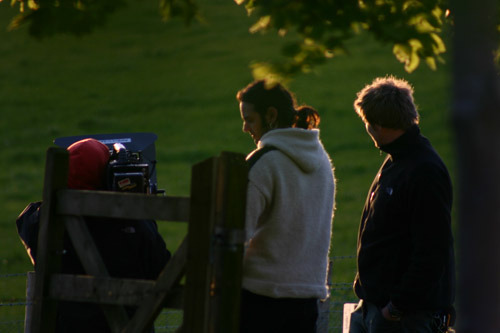ASK & DISCUSS
INDEXI'm going to produce, direct, and write my own feature film, do I need to set up a company for it?
7 years, 8 months ago - Buppha Wittaya-Amponpunt
Hi, everyone. This will be my first time to ask something here. I plan to produce, direct, write, and act in my own feature film, do I need to set up a distribution company to protect myself as a producer, my work, and so on?
I thank you in advance!
Buppha
Only members can post or respond to topics. LOGIN
Not a member of SP? JOIN or FIND OUT MORE
7 years, 8 months ago - Parvez Zabier
You need a Ltd company under which you will produce the film. Hope it Helps
Regards Parvez
7 years, 8 months ago - Richard Anthony Dunford
Not so much a distribution company but a production company yes. Ltd companies are actually pretty straight forward and inexpensive to setup. If you google it you should get loads of links.
7 years, 8 months ago - Buppha Wittaya-Amponpunt
Thanks guys for all your helpful advice. But I don't know if it's worth it since producing films and distributing them can be very tricky and you have to deal with lots of legal stuff. Starting a Ltd. company, you also have to pay tax, hire an accountant, keep an eye on annual return, etc. And if your company doesn't make any money yet it maybe useless? Can I start as a sole trader instead?
7 years, 8 months ago - Paddy Robinson-Griffin
Yes and no. What kind of budget are we talking? If you're doing it as a hobbyist £5k - £50k, you may not need the overhead at this stage. If you're intending to do so on a commercial basis/to sell/make money/benefit from tax credits/seeking investors/planning to reclaim VAT then it's strongly recommended/required.
7 years, 8 months ago - Buppha Wittaya-Amponpunt
Yes, I plan to distribute, sell, make money, claim VAT, seek investors, etc. But, I try to keep the budget as low as possible, which could be somewhere between 1,000 - 3,000 and no more. So, I don't know if it's any good at all to start an Ltd company and all that? But I plan to make more films to make money in the future.
7 years, 8 months ago - John Lubran
Setting up a company is easy and can cost as little as £20 'off the shelf'. You won't need to make a tax declaration for the first two years, you don't need an accountants audit unless you turn over what ever the current six figure sum is, same for VAT. Accounting is very simple, always get receipts/invoices wherever possible, including for very small sums, they add up. It's quite handy how the business of film making can tax detuctably absorb just about any kind of expenditure. A simple ledger recording all monies in and all monies out is easy to keep and will make any use of an accountant for certified returns down the line cheaper, because you'll have done all the actual accounts in your simple ledger. I can introduce you to one who'll do it for less than £400. But the important thing about having a company is what the term Ltd., means; 'Limited Liability'. Whilst directors have certain personal liabilities with regard to honesty, for 99.9% of companies that do get into trouble the effect of limited liability can be relied upon. So if your project fails and in doing so becomes insolvent or accrues any other kind of liability despite the honest intentions of its director(s) he, she or they won't have to sell their houses or become personally bankrupt. Every other legal requirement remains whether one is a sole trader or a company.
If you anticipate having a commercially viable distributable film then having a Ltd., company would be a good idea in terms of keeping more of the profits too. (corporation tax and tax on dividends is low) Also if one has family and friends they can each have £11,300 per tax year tax free either as employees or better still as sole traders themselves.. If in doubt seek professional advice, it ought not cost much for basic advice, maybe even nothing.
7 years, 8 months ago - Buppha Wittaya-Amponpunt
Thanks for all the helpful answers to my question. I really appreciate it. I will consider whether or not I want to start an Ltd company in order to distribute and make money on my film.
7 years, 8 months ago - rob curry
You need to for two reasons.
1. to reclaim vat. You will spend up to 20% more on your production if you don't
2. To get the UK tax credit. If you're making a feature intended for us theatrical release, you can claim 20% of your budget back in cash from the government. You get this whether or not it ends up actually being released.
It's actually not much work. Buy a pre-made company and submit your accounts once a year. if you're literally making it for that little though, it may not be worth your while.
7 years, 8 months ago - Glyn Carter
Hi Buppha - I did what you'e proposing for a project costing around £8k. It was worth it financially, and even more so as a learning curve. However for anything much less than this, the bother would have outweighed the benefit.
If your budget is £3,000 max, your VAT spent will be £600 max. [I guess it will be less, because some of your expenditure won't be VAT-able in the first place, like food (you can't afford a pro caterer on your budget), payments to unregistered freelancers, travel.]
To reclaim any VAT, you'll need a company, and almost certainly an accountant or competent book-keeper. If that person costs you £400, you have less than £200 of your VAT reclaim.
If you want to get Film Tax Credit at 20% of the £3000, that's £500 you'd get back, but your accountant will charge extra for this - £250 if you're very lucky. So your gain is only £250.
More importantly, you'll probably spend time and energy and stress on this, when your focus as a filmmaker will be on casting, location, crew, equipment, catering and all the practical minutiae, not to mention contracts and rights agreements.
Perhaps it comes down to where you want to be in five years. If it's on the creative side, I'd advise that you go and make a film with the resources you have. If you're likely to get into the business side of production, "learning by doing" now will be a steep but valuable learning curve.
I would strongly recommend getting a dedicated bank account for the film though. Make all payments from that. Most banks don't charge for the first year or two of a business account. You can do this as a sole trader, and you can use a trading name (eg "XYZ Productions") which adds professinalism when you come to dealing with distributors down the line. If you stand to make a decent profit, that's the time to spend some of it on prefessionals.
7 years, 8 months ago - Adrienne Aiken
I'd just like to add my input. I know many many new filmmakers making their first (few) films who don't have ltd. companies - some don't even have a sole trading/partnership company of any kind to start with. You CAN make a film without being a company of any kind, but in its favour are the following:
1. It would be more professional if everything went through a company name - ltd or otherwise (both actual and visibly to others)
2. A limited company (as opposed to a sole trading or partnership 'company') would protect your personal assets if either the finances went pearshaped and you ended up in debt for any reason (but unlikely you'd be silly enough to go spend a load of money you haven't raised) - or if any of your partners/producers spent budgets they didn't have. But if handled professionally, this shouldn't happen.
3. Any other financial and tax benefits as above (that I'm afraid I don't know that much about)
Setting up a limited company shouldn't however, be a light undertaking. Aside from it costing you to buy a company (off the shelf or from scratch) it affects how you handle your accounts, bank accounts, wages and you will need an accountant - nad that will incur far higher accounting costs if limited than otherwise, as there are very formal ways limited companies have to be set up and run (including having audits done - I think it's annually - at a further cost).
I know everyone here has said - yeah - do it.... but if you are just making a first film, don't let the hassle of having a limited company and the costs/time it takes to set up, get your head around and work through, put you off making that film!
7 years, 8 months ago - Buppha Wittaya-Amponpunt
I think, I will go as a sole trader then since I want to make movies with as low budget as possible to begin with. I see a movie like Tangerine, for instance, which shot on an iphone. But it managed to succeed. Or Boys Don't Cry or The Blair Witch Project .
7 years, 8 months ago - Buppha Wittaya-Amponpunt
Thank you so much for all the useful advice guys. Now I have a much clearer idea of whether or not I'd start a company to make film. And I come to a conclusion that I don't need to at this stage. I will just produce low-budget films and try to find a distribution company instead. I hope this advice will be useful for anyone wishing to produce feature films on their own like me.
7 years, 8 months ago - Marlom Tander
Buppha, you DO NEED a Limited Co because you used the word "Investors". If you have investors, but no limited company then in law you are accidentally by default setting up a partnership in which all investors have joint and several liability. Welcome to the 4 most scary words in Uk business tax and law.
If you this on your own, or with LENDERS (not investors) you don't need a company, but if you are going to have investors, you really need to know what you are doing. And your investors, if they know anything at all, should make it a condition of their investment OR require a formal agreement that defines their participation and that YOU keep all the liability.
Such documentation (to be sound if tested) involves paying lawyers and so mostly people just say "lets have a limited co" because then the participation can be defined in a simple agreement and the liability is clear - it's limited to company assets, (at least until you sign a personal guarantee for a credit line and then your house is on the line, but your investors are still only at risk for their investment, nothing else).
7 years, 8 months ago - Buppha Wittaya-Amponpunt
I plan to use my own money, shooting the film with the DSLR camera I already have. So in that case, I don't need a Limited company, I think.
7 years, 8 months ago - John Lubran
You don't need to be Ltd., company to be VAT registered though it's better to have one. Keeping ones business affairs separate from ones private affairs is very sensible. You don't need an accountant or even a book keeper to administrate your VAT every three months. It's easy. Most transactions in film making result in a net VAT benefit.
7 years, 8 months ago - Marlom Tander
Own money, you don't need a limited company, but be alert to all payroll and insurance issues, and other unexpected causes of potential liability.
For example someone might agree to work for free, for experience. And then turn round after the production wraps and demand minimum wage. A limited company with no assets loses the case, and so what. But if YOU lose the case (you will, the fact that the film was made shows they did a job of work, not just a tea making intern, and your agreement is not legal) all your personal assets are on the line.
It doesn't take too many cast and crew to do that to leave you on the line for thousands.
Setting aside other issues, a limited company has costs, but those costs are really an insurance against shit happening, in that they stop your house and savings being taken if stuff goes badly wrong.
Can you afford to pay for everything, at full price, (inc minimum wage and all expenses for all cast and crew) plus the excess on any insurance claim, plus potential uninsured losses relating to kit, costumes, props and locations (think Flood, small fire. The property might be insured but the insurance company will come after your house to recoup).
If yes you have such funds, you don't need the liability protection of a Ltd Co. If no, then you should consider it, and if still no, review Murphys law before deciding for sure :-)
Have fun :-)
7 years, 8 months ago - Marlom Tander
FWIW I run three Ltd Co's. Pretty much everything you need to worry about is online via the Gvt gateway and Companies House, and so long as you keep good books (ideally have all expenses and incomes as single items in the bank statement so you - and more importantly, your accountant, can see what is happening) it really isn't much more awkward than running sole trader.
7 years, 8 months ago - Paddy Robinson-Griffin
Hi Marlom, I don't know that a limited company will absolve the director of that company for paying below NMW, for instance, the company can't be a get out of jail free card. In that case, you'd have HMRC on your back personally anyway, for instance. Directing a limited company does have duties and personal responsibilities for the directors. I know you know this, so this is more to colour the thread than anything else :)
Personally, I'm of the persuasion that Buppa isn't really in the position for this to need to be formalised as frankly she'll be doing everything on the shoot anyway, on a hobbyist basis, hopefully insured comprehensively, but it's going to depend fully on favours day by day I think
7 years, 8 months ago - PHIL WEST
I wouldn't bother contemplating being a Ltd company until you see some actual results from your business. Especially if your budgets are low to start off with. You don't want to put the cart before the horse and go Ltd only to find out your products aren't selling.
A Ltd company I've always said is something you build up to.
I don't know if that helps but good luck and have fun! :)
7 years, 8 months ago - Marlom Tander
Paddy, for the sake of clarity, i agree. (Shouldn't have used Min Wage as my example).
7 years, 7 months ago - Vasco de Sousa
What you need is insurance. Also, vat registration is not automatic with a limited company, nor is .
If you're just one person, a limited company does not provide much protection. You'll still have to underwrite the loans, and be responsible for the decisions. What a single purpose vehicle can do is make it easier to sell the film as a whole, and it can protect your investors (but you'll still be liable for your own actions.
My suggestion is to talk to any business advisors, such as women in business, rather than microbudget filmmakers. Paddy and John seem to have experience with limited companies, I'm not sure about the others. Ltds are extra paperwork, and you can get fined for being late. However, partnerships are scary, and ltds aren't that expensive to set up and file. (And they are pretty easy to close, if you have to do that.)
Most of the people here mean well, but there is a bravado tendency to provide advice on things that they know little about.
Also, start your limited company on the last working day in March. That way, it coincides more or less with the PAYE tax year, and the VAT returns, making accounting simpler.
4 years, 9 months ago - Buppha Wittaya-Amponpunt
I just want to make the film from the screenplay I have written, which I get a feeling is a good script since it's original and inspired by a true story. Then I plan to send it to film festivals to kick off my career as a writer & director. So, I may not need to start a company. I just need to find a producer and a fund to make the film. I think.
4 years, 9 months ago - Katherine Armstrong
To make sure pursuing the film is worthwhile, have your script looked at by other professionals, don't just rely on your own judgement. If the script is good enough, and you have a treatment for it, you can start getting people involved
4 years, 9 months ago - Ian Allardyce
Having made two features I would just add to the above that... the journey is long and arduous to get to that first day of principle photography... so I would hold off registering a LTD company until the weeks leading up to the shoot. It only takes a moment to register online, but is more difficult to undo. So what I'm suggesting is that once you are certain you will be shooting, do it maybe three to four weeks prior, not before whilst you're still scripting, casting, etc. hope that helps.
4 years, 9 months ago - Buppha Wittaya-Amponpunt
Thank you guys for the useful advice. I really appreciate it.
4 years, 9 months ago - Nadaav Soudry
lots of talk above about VAT. Just a quick note that you do not need a LTD company to be VAT registered. A sole trader can also be VAT registered. I think I read you are talking about a budget of £1k-£3k. I have made shorts with budgets higher than that, and ran them entirely through my sole trader books. It is totally legit to do so.
4 years, 9 months ago - Buppha Wittaya-Amponpunt
Thanks Nadaav for your advice. I just want to make a feature film to kick-start my careers as a writer & director. Also because I think I have a very unique, true story to tell. Could I just start a crowdfunding on Kickstarter to fund for my film without having to start a company / sole trader? Or maybe find a producer to collab with?













